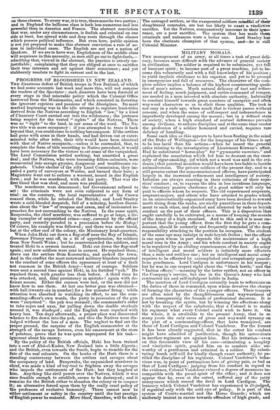PROGRESS OF BLOODSHED IN NEW ZEALAND. THE disastrous defeat of
British troops in New Zealand, of which we had some accounts last week and more this, will not surprise the readers of the Spectator : such disasters have been foretold at every stage in that miserable policy which the Colonial Office borrowed from the Missionaries, and which consisted in fostering the ignorant caprices and passions of the Aborigines. Its most marked beginning was in the idle attempt to regulate land-titles derived from the Natives according to English "law," by a kind of Chancery Court carried out into the wilderness ; the pretence being respect for the vested 4' rights" of the Natives. There was no " right " to the land, in our sense of the word. The Na- tive title was mere occupancy : if you attempted to trace it back beyond that, you could come to nothing but conquest. If the settlers had gone with arms in their hands, and had driven out or exter- minated tribe after tribe, their title would have been identical with that of Native occupants,—unless it be contended, that, to complete the form of title according to Native precedent, it would have been necessary for the victors to eat some of the vanquished. The Land Commission settled nothing, but unsettled a great deal ; and the Natives, who were becoming fellow-colonists, were reconverted into savage gypsies, dangerous and troublesome va- gabonds. Under shelter of the silly Land Commission, they im- peded a party of surveyors at Wairau, and burned their huts ; a Magistrate went out to enforce a warrant, issued in due English form ; and he was murdered, with all his party. That was the first blood that was shed, and more was predicted.
The murderers were denounced ; but Government refused to act : the criminals were not even subjected to any form of trial : on the contrary, the local representative of the Crown coaxed them while he rebuked the British and Lord Stanley wrote a cold-blooded despatch, full of a mincing, bootless discus- sion about the " law " of trespass and arson, and of insinuated re- proaches for not succumbing to the Natives. In the same spirit, illauperaha, the chief murderer, was suffered to go at large, a liv- ing exemplar of unpunished crime—nay, caressed by the official party, and recently paraded in a procession before the Bishop! Of course, his example was followed ; and there was more blood, hut.at the other end of the colony, the Missionary head-quarters.
When John Held cut down a flag-staff near the Bay of Islands, Governor Fitzroy sent off; in a fit of apprehension, for soldiers from New South Wales ; but he countermanded the soldiers, and treated Heki to a sermon instead. Heki cut down the flag-staff again ; and now soldiers were sent in earnest. He repulsed them; drove out the settlers from Kororarika, and sacked the town. And in the conflict the most untoward military blunders imparted to the conduct of some officers the appearance at least of a fault not common in the British Army—want of courage. Soldiers were sent a second time against Heki, in his fortified "pah." He repulsed them, with greater loss than before. A third time he was attacked, and, fatal persistency in mistake ! again with de- ficient means. Either the cannon were bad, or the men did not know how to use them. At last one better gun was obtained— with ball (twenty-six in number) for a few minutes' firing : while attention was absorbed in watching its effect, to use the corn- rnanding-officer's own words, the party in possession of the gun were "surprised": the pah was stormed ; the commander's order to take ropes and axes, for pulling down the double stockade around it, was disobeyed ; and the English were repulsed with heavy loss. Ten days afterwards, a proper place was discovered 'whence to fire down into the pah, and then the Natives were dis- lodged without the loss of a man. The neglect to find out the proper ground, the surprise of the English commander at the strength of the savage fortress, even his amazement at the store -a potatoes, prove that he -was quite unprepared for his task— ignorant about his enemy. By the policy of the British officials, Heki has been trained into a sort of Abd-el-Kader, New Zealand into a little Algeria ; and the British, even towards the South, begin to tremble for the fate of the real colonists. On the banks of the Hutt there is a standing controversy, between the settlers and savages about the occupancy, of land. Rauperaha, the unpunished murderer in thief, was made a kind of-toy-tool to frighten away the savages who impede the settlements of the Hutt ; but they laughed at him. Anything like civil power over the Natives, which it was once feasible enough to establish, seems to be destroyed ; and it 'remains for the British either to abandon the colony or to conquer It; an alternative forced upon them by the really cruel policy of the professors of exclusive humanity. There cannot now be either settlement or safety in the country until the lost prestige tif English powerhe restored. More blood,- therefore,-will be shed. The outraged settlers, or the exasperated soldiers mislead of their slaughtered comrades, are but too likely to exact a vindictive sacrifice. Yet the Natives, comparatively innocent in their igno- rance, are a poor sacrifice. The system that has made them criminals and nuisances were a better one. Lord Stanley has been the obstinate champion of that system, and—he is still Colonial Minister.


























 Previous page
Previous page